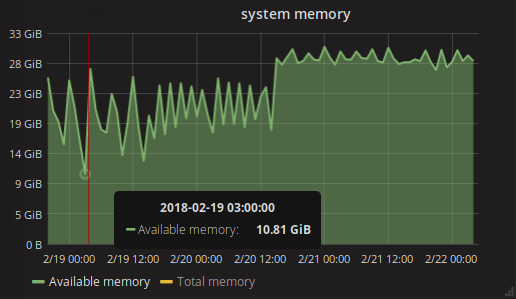$ ./mem-free-release-test.pl --all
Name:
mem-free-release-test.pl - example script to test and demonstrate how
and when memory is being released back to the system
Usage:
./mem-free-release-test.pl --all
./mem-free-release-test.pl --test 10
--test X execute one test only, default 1
--all execute all X+ tests
Description:
This script includes 1 to X memory allocation test cases. These cases
can be executed per one using "--test X" or all sequentially using
"--all" switches.
Each test will perform a code inside a block and print out memory usage
within and after leaving the block scope → when the local variable
memory is garbage collected and freed.
Cases where the allocated memory inside and outside the block are
(nearly) the same are not memory leaks, memory is returned back for
further usage, but only inside that given process. Cases where the
allocated memory decreases outside the block means that the memory was
freed and returned back to the operating system. See below link to
stackoverflow question 2215259 about malloc() and returning memory back
to the OS.
(Will malloc implementations return free-ed memory back to the system?
<
https://stackoverflow.com/questions/2215259>)
Long story short → M_TRIM_THRESHOLD in Linux is by default set to 128K,
only memory blocks of 128K size are returned back to the OS.
This does not help a lot with huge number of small data strictures
arrays-of-hashes-of-hashes, unless a small trick is used.
--------------------------------------------------------------------------------
Perl execution of this script
just do nothing....
done test case 1
allocated memory size: 9.90M
--------------------------------------------------------------------------------
create 100mio character big scalar using 100 character chunks
code: $t .= "a"x100 for 1..1_000_000;
length($t): 100000000
allocated memory size: 116.96M
done test case 2
allocated memory size: 116.96M
--------------------------------------------------------------------------------
create 100mio character big scalar using "x" constructor
code: $t .= "." x 100_000_000;
length($t): 100000000
allocated memory size: 200.65M
done test case 3
allocated memory size: 105.28M
--------------------------------------------------------------------------------
create array with 1_000 scalars, each little less then 128kB
code: push(@ta, "." x (128*1024-14)) for (1..1_000);
scalar(@ta): 1000
allocated memory size: 135.09M
done test case 4
allocated memory size: 135.09M
--------------------------------------------------------------------------------
create array with 1_000 scalars, each 128kB big
code: push(@ta, "." x (128*1024-13)) for (1..1_000);
scalar(@ta): 1000
allocated memory size: 138.95M
done test case 5
allocated memory size: 9.91M
--------------------------------------------------------------------------------
create hash with 1_000_000 scalars each 100 characters big
code: $th{"k".$key_id++} = "x".100 for (1..1_000_000);
scalar(keys %th): 1000000
allocated memory size: 108.93M
done test case 6
allocated memory size: 108.93M
--------------------------------------------------------------------------------
create 2x hashes with 1_000_000 scalars 100 characters big
code: for (1..1_000_000) { $th{"k".$key_id++} = "x".100; $th2{"k".$key_id++} = "x".100 }
scalar(keys %th): 1000000
scalar(keys %th2): 1000000
allocated memory size: 209.38M
done test case 7
allocated memory size: 209.51M
--------------------------------------------------------------------------------
create 2x hashes with 1_000_000 scalars 100 characters big, but with same set of keys
(Perl hash keys have shared storage in Perl, that is why less memory is used)
code: for (1..1_000_000) { $th{"k".$key_id} = "x".100; $th2{"k".$key_id++} = "x".100 }
scalar(keys %th): 1000000
scalar(keys %th2): 1000000
allocated memory size: 167.23M
done test case 8
allocated memory size: 167.36M
--------------------------------------------------------------------------------
create 2x hashes with 1_000_000 scalars (via two 1_000 loops) 100 characters big
code: for (1..1_000) { for (1..1_000) { $th{"k".$key_id++} = "x".100; $th2{"k".$key_id++} = "x".100 } }
scalar(keys %th): 1000000
scalar(keys %th2): 1000000
allocated memory size: 209.38M
done test case 9
allocated memory size: 209.51M
--------------------------------------------------------------------------------
create array with serialized 2x hashes with 1_000_000 scalars (via two 1_000 loops) 100 characters big
(serialization functions are also doing compression)
code: for (1..1_000) { for (1..1_000) { $th{"k".$key_id++} = "x".100; $th2{"k".$key_id++} = "x".100 }; push(@ta, freeze(\%th), freeze(\%th2)); (%th, %th2) = (); }
scalar(keys %th): 0
scalar(keys %th2): 0
scalar(@ta): 2000
length($ta[-1]): 18020
thaw($ta[-1]): HASH(0x861ad64)
sum(map {scalar(keys(%{thaw($_)}))} @ta): 2000000
allocated memory size: 44.55M
done test case 10
allocated memory size: 42.57M
--------------------------------------------------------------------------------
create array with serialized 2x hashes with 1_000_000 scalars (via two 500x2000 loop) 100 random characters big
(random characters there so that the serialization is not able to compress this data)
code: for (1..500) { for (1..2_000) { $key_id++; $th{"k".$key_id} .= chr(rand(256)) for 1..100; $th2{"k".$key_id} .= chr(rand(256)) for 1..100 }; push(@ta, freeze(\%th), freeze(\%th2)); (%th, %th2) = (); }
scalar(keys %th): 0
scalar(keys %th2): 0
scalar(@ta): 1000
length($ta[-1]): 228020
thaw($ta[-1]): HASH(0x85f1654)
sum(map {scalar(keys(%{thaw($_)}))} @ta): 2000000
allocated memory size: 229.71M
done test case 11
allocated memory size: 10.96M
--------------------------------------------------------------------------------
Tips for Less Memory Footprint:
read the Rules Of Optimization Club
<
http://wiki.c2.com/?RulesOfOptimizationClub>
just add more memory
Unless that code is taking gigabytes of memory, don't worry, memory
is cheap and plentiful these days, or?
have a good coffee and good monitoring at your side
Chart the (virtual) server memory free over long period to spot
extremes and to see effects of your memory optimisations.
terminate and restart
The simplest way to release memory is to terminate the process,
possibly with status saved, and then start it again right away.
SystemD and daemontools understands this concept and can be
configured for continuous restarts.
work in chunks if possible
Query database using cursors, 1_000 rows at a time, process it and
then do the next.
If you need to load 1_000_000 data hashes, split them into chunks
that can be serialized. With or without compression freezed data
structures takes much less memory. Memory of those block, when
greater then 128k, will be returned back to the system.
fork before memory intensive operation
If the processed data just needs to be saved to disk, or
transferred, or post processed once all in-memory you can fork off a
child process to do this job. Will not only make that tasks run in
parallel, but also all the extra memory allocated inside the child
process will be cleared by process termination.
see Also:
Linux::Smaps - a Perl interface to /proc/PID/smaps
<
https://metacpan.org/pod/Linux::Smaps>
Sereal - Fast, compact, powerful binary (de-)serialization
<
https://metacpan.org/pod/Sereal>
Parallel::ForkManager - A simple parallel processing fork manager
<
https://metacpan.org/pod/Parallel::ForkManager>
--------------------------------------------------------------------------------
